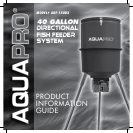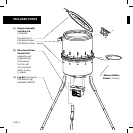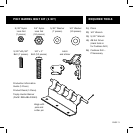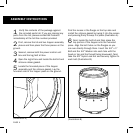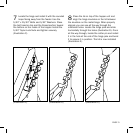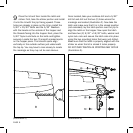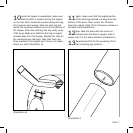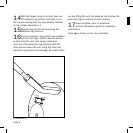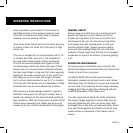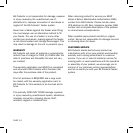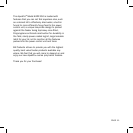
PAGE 9
Once a suitable, level location for the feeder is
identified and the unit is properly erected, open
lid and fill container with feed/seed to desired
capacity, never to exceed 150 lbs.
Once done, close the lid and lock the latch securely
to insure it does not come off in the event of high
winds, etc.
This unit is designed to be used primarily with 1/4”
or smaller fish food. This unit is not intended to
be used with a wide variety of other type feeds.
The unit can accommodate other types of feed
but depending on both the brand and type of feed
being used, you may encounter instances whereby
the feed may bridge or clog over the funnel opening
leading to the power control unit. In the event that
this happens, you can clear the bridge manually,
but it is then recommended to use 1/4” or smaller
fish food with this feeder and not alternative of feed
products that may be more affected by moisture.
Each and every feeder design endures a rigorous
field-test routine prior to coming to market, but no
feeder can address all the environmental and feed
type variations. With this being said, consider all the
factors when operating this feeder and be sure to
assess all of your environmental factors thoroughly.
GENERAL SAFETY
Always make sure that the unit is placed on level
ground/surface and is level before you fill the
hopper with any feed. If the unit is not level and
the hopper is full, you run the serious risk of the
unit tipping over and causing harm to both you
and the product itself. Always exercise caution
and care when loading/filling the unit with feed
material. Please make sure that the unit is properly
supported so there is no chance of anyone getting
hurt.
SUGGESTED MAINTENANCE
To insure proper functionality and a long life, BA
Products strongly recommends that you service your
feeder at least once every year.
The Model #ADF-150 should have the hopper
thoroughly cleaned out at least once a year. Some
feed types have the tendency to cake and may build
up over time, thus reducing overall hopper capacity,
clogging feed flow or generally interfering with the
overall functionality of the feeder unit.
It is also important to check the bolts located at
the hopper flange regularly to insure that they are
securely tightened and have not come lose. With
prolonged use in the field, animals and other forces
may exert force against the feeder unit which may
cause certain components of the feeder unit to
loosen.
OPERATING INSTRUCTIONS



